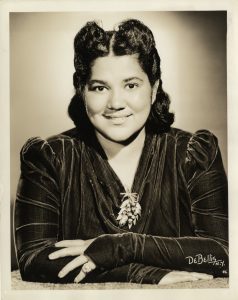Podcast: Play in new window | Download (Duration: 1:15:43 — 80.5MB) | Embed
Subscribe: Spotify | TuneIn | RSS | More
I lead off my new episodes for Black History Month 2023 with one of the most glorious voices ever captured on recordings, Dorothy Maynor (03 September 1910 – 19 February 1996), one of the most glorious lyric soprano voices ever captured on recording. Discovered by Serge Koussevitzky in the late 1930s and championed by him and a host of other conductors (including Leopold Stokowski and Eugene Ormandy), she became renowned as a recitalist but, because of restrictions of the era placed upon Black singers, never sang on any operatic stage. Nevertheless, her studio recordings of arias by Mozart, Debussy, and Charpentier are legendary. Our appreciation of Maynor the singer is greatly enhanced by the presence of live radio recordings as well as a recently-issued live 1940 song recital from the Library of Congress. It is one of the great injustices of musical history that gifted Black singers of Maynor’s caliber from that era were outrightly denied the opportunity to perform in staged opera performances at venues like the Metropolitan Opera. Dorothy Maynor nonetheless persevered and left an incredible legacy, and not just a vocal one: in 1963, the year of her retirement from singing, she founded the Harlem School of the Arts, for which, before she stepped down as President in 1979, she raised more than $2 million dollars for the construction of a new facility for the institution. She also was the first African American singer to perform at a presidential inaugural (both for Harry S. Truman in 1949 and Dwight D. Eisenhower four years later), as well as the first African American to sit on the Board of Directors of the Metropolitan Opera. This episode features Maynor in live, studio, and radio recordings of repertoire by Bach, Handel, Schubert, and Mendelssohn, as well as some of the finest recordings of spirituals ever made. Also heard are the songs of three Black composers, Samuel Coleridge-Taylor, Cecil Cohen, and R. Nathaniel Dett, the latter of which Maynor studied with at the Hampton Institute, whose work Maynor frequently programmed on her recitals. The episode opens with a joyous birthday tribute to next week’s subject, Martina Arroyo, whose 1974 album of spirituals was backed by the Choir of the Harlem School of the Arts conducted by Maynor herself.
Countermelody is a podcast devoted to the glory and the power of the human voice raised in song. Singer and vocal aficionado Daniel Gundlach explores great singers of the past and present focusing in particular on those who are less well-remembered today than they should be. Daniel’s lifetime in music as a professional countertenor, pianist, vocal coach, voice teacher, and journalist yields an exciting array of anecdotes, impressions, and “inside stories.” At Countermelody’s core is the celebration of great singers of all stripes, their instruments, and the connection they make to the words they sing. By clicking on the following link (https://linktr.ee/CountermelodyPodcast) you can find the dedicated Countermelody website which contains additional content including artist photos and episode setlists. The link will also take you to Countermelody’s Patreon page, where you can pledge your monthly support at whatever level you can afford. Bonus episodes available exclusively to Patreon supporters are currently available and further bonus content including interviews and livestreams is planned for the upcoming season.

